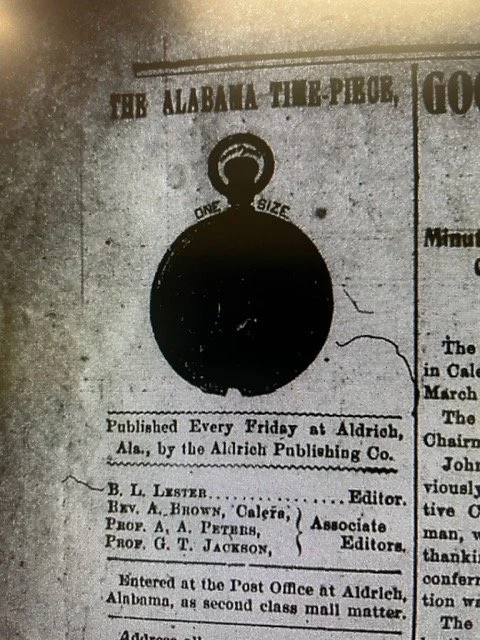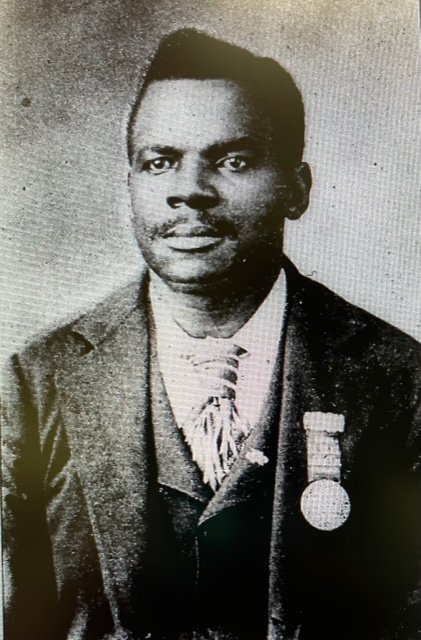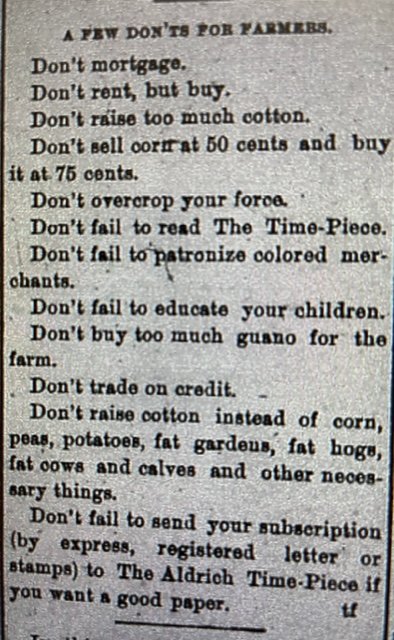Keeping Times with the Times: The Aldrich Time-Piece
From 1895 to 1902, in the coal mining town of Aldrich, a Black-edited newspaper was published weekly. The Aldrich Time-Piece is an untold story of African American initiative and and self-expression in the post-Reconstruction period. Remarkably, it put Black experience at the center of an enterprise that boldly proclaimed its desire to be read "in every home in Alabama."
The Time-Piece was published every Friday by the Aldrich Publishing Co. A number of issues from 1898 have survived on microfilm. The paper, which declared itself to be the official organ of the Shelby county GOP, was probably subsidized by William F. Aldrich, the coal-mine operator who gave his name to the town and who was three times elected to Congress from the 4th District. The Time-Piece campaigned hard for Aldrich, a Republican, during election season. As the editor wrote, "The negro must vote with the party which set him free, when other parties were beating the very life out of him" (14 Oct).
A key figure in the Time-Piece story is its editor, B. L. "Booker" Lester. An energetic young man with a passion for education, Lester served also as principal of Aldrich Grammar School and may have been responsible for its ambitious progressive curriculum. The Bibb County Baptist Association hailed him as one of several fine teachers "struggling to bring our people up, along this educational line" and a "hero in our Sunday School work."
To get a taste of the style of Lester's editorship, in particular his humorous approach to the theme of Black betterment, consider this excerpt from "A Few Don'ts for Farmers."
This wry advice to local farmers illustrates his emphasis on economic self-sufficiency and education. "Don't fail to patronise colored merchants," he urges; "Don't fail to educate your children." And, finally, “don't fail to subscribe to the Time-Piece”!
Every surviving issue of Time-Piece highlights Black business enterprises in the area. A large ad that ran every week promotes a "Negro Store" in nearby Randolph. The language pleads its own cause of racial independence: "We are not in opposition to white's stores," it begins reassuringly, "but we Negroes want to DO SOMETHING, accomplish SOMETHING and TURN UP SOMETHING" by selling our own goods to our own people. A section entitled Local and Personal (May 5) leads with an account of the general merchandise store recently opened in Aldrich by
Rev. Prentice & Son. (Prentice is the same esteemed religious leader for whom the all-Negro Montevallo HS was later named.) The store offered Black mining families an alternative to the more expensive company store, and it promised that patrons would be treated with respect. "Call and see them. They will treat you right."
To promote his own enterprise, Lester uses a teasing, whimsical language that amuses while presenting a non-threatening face to his white supporters. He urges his readers to act as subscription agents. The Time-Piece should be read "in every home in Alabama." He indulges in a little lively word play: "If you want to keep Times with the Times, the Time-Piece is the TIMELY and TIMIEST TIMES. Please, dear reader, send Timely orders, with Timely cash, to the Time Piece."
It is a sign of the vitality of the Black coal mining community at Aldrich that for nearly seven years it nourished the educational and economic activism of Booker Lester and the Time-Piece. The story continues next month.
Photos from microfilm consulted in Samford University Special Collections.
Contact us at MontevalloLegacy@gmail.com. We want to hear your stories and welcome correction of any errors of fact or interpretation.




